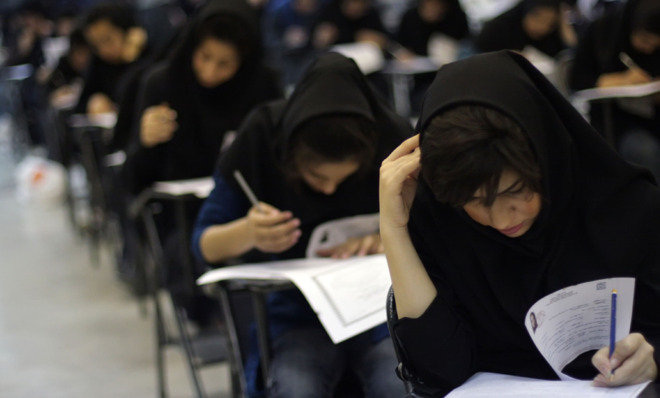The gruesome details of Iran's alleged torture of students
"My first interrogator started by calling me a whore"

A free daily email with the biggest news stories of the day – and the best features from TheWeek.com
You are now subscribed
Your newsletter sign-up was successful
In June 2009, following the contentious re-election of Iranian President Mahmoud Ahmadinejad, Iranian security forces raided dorms at Tehran University, allegedly armed with tear gas. According to reports, some students were beaten, some killed, and others vanished.
This week, Amnesty International released a new report on the repression of students and academics in Iran that sheds light on what happened to some of the student activists who protested Ahmadinejad's regime. The report is thick with allegations of unfair trials, beatings, rape threats, and torture.
"They blindfolded us and made us lie down in a van. They took us somewhere that looked like a mosque. They put us all in a room. Every couple of hours some men would enter the room and beat us using motorcycle chains. I was just praying that I would not get raped," Amir Rezaei, a student at Oroumieh University, told Amnesty last year of his experience being detained in the fall of 2009. He was arrested in November and again in December when, Rezaei says, the regime's Revolutionary Guards arrested him again, and placed him in solitary confinement for over three weeks.
The Week
Escape your echo chamber. Get the facts behind the news, plus analysis from multiple perspectives.

Sign up for The Week's Free Newsletters
From our morning news briefing to a weekly Good News Newsletter, get the best of The Week delivered directly to your inbox.
From our morning news briefing to a weekly Good News Newsletter, get the best of The Week delivered directly to your inbox.
For decades, Iranian authorities have considered universities to be a hotbed of political dissent. In 2009, schools were blamed for contributing to the anti-government protests that swept Iran. Arash Sadegh, a student who worked on the campaign of reformist candidate Mir Hossein Mousavi, who ran against Ahmadinejad, was arrested several times between 2009 and 2012. He alleges that he was "hung from the ceiling by one leg and left hanging for up to five hours at a time," had his shoulder dislocated twice by interrogators, and was forced to "lick a soiled toilet bowl." As of March 2014, he was awaiting trial on new charges such as "spreading propaganda," the report notes. Another student activist detained in the spring of 2009, Hossein Torkashvand, described being forced to do squats for long periods, and being unable to go to the toilet because of the pain.
Amnesty reports that many students have been tried before the Revolutionary Courts, where only a single judge presides, and cases are often adjudicated behind closed doors, accessible to neither the public nor the press. Defendants are allegedly denied access to lawyers, and are tortured into making taped confessions, for crimes such as "spreading propaganda against the system" and "insulting the supreme leader." Amnesty says that former prisoners reported being told what their sentences would be by their interrogators prior to trial.
"The first day of interrogations was the worst one. My first interrogator started by calling me a whore. He would beat me on my head and face whatever I answered him...He also threatened me with rape," Rozhin Mohammadi, a blogger who was arrested in 2011 when she arrived at the airport in Tehran, told Amnesty. She says that her brother was also detained, and was suspended by his arms for hours, leaving his shoulders dislocated. As recently as last year, Amir Chamani, a sociology graduate student, received 40 lashes for "insulting" Ahmadinejad, according to the report.
Amnesty notes that torturing students isn't the only way the Ahmadinejad regime repressed universities. There have also been efforts to eradicate Western and secular influences from the curriculum, and decrease the number of female students, by implementing quotas. The report notes that Iran's new president, Hassan Rouhani, has allowed a number of banned students to return to school, but other students remain in prison. And there have been some "fresh arrests" since Rouhani's election.
A free daily email with the biggest news stories of the day – and the best features from TheWeek.com
"Relentless efforts to tighten the stranglehold on academic freedom, banish peaceful student activists and side-line women and religious minorities, have squeezed the life out of Iran’s academic institutions leaving little room for freedom of thought," said Hassiba Hadj Sahraoui, deputy director of the Middle East and North Africa program at Amnesty.
Dana Liebelson is a reporter for Mother Jones. A graduate of George Washington University, she has worked for a variety of advocacy organizations in the District, including the Project on Government Oversight, International Center for Journalists, Rethink Media, the Reporters Committee for Freedom of the Press, and Change.org. She speaks Mandarin and German and plays violin in the D.C.-based Indie rock band Bellflur.
-
 The Olympic timekeepers keeping the Games on track
The Olympic timekeepers keeping the Games on trackUnder the Radar Swiss watchmaking giant Omega has been at the finish line of every Olympic Games for nearly 100 years
-
 Will increasing tensions with Iran boil over into war?
Will increasing tensions with Iran boil over into war?Today’s Big Question President Donald Trump has recently been threatening the country
-
 Corruption: The spy sheikh and the president
Corruption: The spy sheikh and the presidentFeature Trump is at the center of another scandal